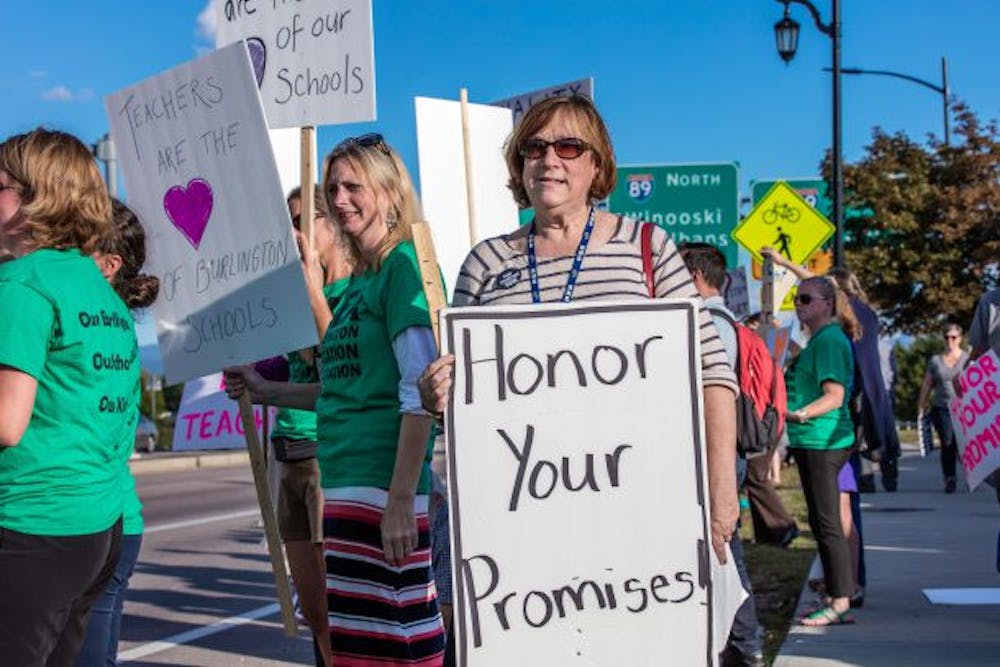After two years of contentious negotiations with the school board, the Burlington teachers’ union voted to go on strike on Sept. 7. This represents the first time a teachers’ strike has occurred in Burlington since Sept. 1978. The issues surrounding this September’s contentious contract negotiations between the school board and teachers’ union centered on adequate planning time for elementary school teachers as well as recent budget and hours cuts that have recently plagued the Burlington school district.
Over one hundred teachers picketed outside Staples Plaza on Williston and outside Burlington public schools.
“A lot of people didn’t believe that Burlington teachers would actually go on strike, again underestimating us and not taking us seriously,” said Fran Brock, president of the Burlington Education Association. “Because [the school board] imposed [new working conditions] for a second year in a row, we felt there were no options left except to strike.”
This isn’t the first time negotiations between the school board and the teachers’ union reached a stalemate. Last year, the school board also created new, unwelcome working conditions. Although the two parties were able to reach an agreement the night before the union set to go on strike last year, remaining hostility remained that fueled the contentious negotiations this September.
“We found ourselves in the same place this year,” Brock said. “We tried to get the school board to be more responsive, so we voted again to strike.”
On Sept. 1, the Burlington public school board voted to impose working conditions on teachers within the district for the second year in a row, which included salary and healthcare changes as well as elimination of some of the elementary school teachers’ planning periods. After the school board imposed the working conditions, 95 percent of teachers voted to go on strike.
“A culmination of frustration and annoyance that the administration were really being disrespectful, weren’t listening to the teachers, dropping people into positions, just the idea that the board sanctioned the administration constant cuts and shifting around of people” fueled the strike, according to Brock.
While the board proposed a 2.4 percent salary increase, the union countered with a 2.96 percent salary increase in the first year and a 3.2 percent salary increase in the second year. The new healthcare system proposed by the school board, the Vermont Education Health Initiative, also included a lower percentage of out-of-pocket costs paid by individual members than the previous plan.
While salaries were important, the union maintains that their breaking point was the removal of planning periods for elementary school teachers. Brock maintains that these planning periods are essential to closing the achievement gap in Burlington public schools. In order to give elementary school teachers more planning time, the union suggests hiring more para-educators, like teachers’ aids, to aid educators at the elementary level. The board’s resolution includes changing two blocks of time formerly used as planning periods for teachers and to district-controlled supplemental education blocks, in which teachers will provide supplemental activities for their students. Moreover, the board requires that teachers maintain their non-educational duties, like playground and lunch duty.
“What’s lost to the general public is that there’s been a lot of changes on how we are expected to deliver education and it requires more one on one time with children and more collaborative work with teams — teams work together to develop student-centered learning,” Brock said. “There’s much more of a need for teachers to have planning time during the school day to have those collaborative meetings and work one on one with kids.”
The strike caused the Burlington school district to cancel four days of classes, with school resuming Wednesday, Sept. 20. Almost four thousand students were provided free lunch during the strike. For working parents, however, childcare options were limited. Many students spent their days in the public libraries while other parents paid to send their children to specially set up camps.
The two parties used independent mediator Ira Lobel to help settle the dispute. The settlement was reached Sept. 19 at 8 p.m. Although the official details of the new contract have not been revealed, both sides maintain the agreeability of the terms.
“We did get some of the elementary [school requests] the in contract, but [it]won’t go into effect until next year. This will require [the] district to hire more educators and give existing educators more hours,” Brock said. “It is a better contract than last year, but I don’t think either side got everything they wanted.”
Vermont is currently the only New England state that uses a collective bargaining system to settle labor disputes, which consequently allows teachers to strike. Vermont state Representative Kurt Wright (R-Burlington) and state Sen. Joe Benning (R-Caledonia) both plan to introduce bills in January that would set up new systems of contract resolution, thus banning future teachers’ strikes. Wright and Benning are looking for a system other than binding arbitration, which is what many states that ban strikes use to resolve employment disputes. The new bill in question, however, is not without its critics. Sen. Anthony Pollina (P/D-Washington) strongly opposes the bill on the grounds that it undermines “the strength and very existence of unions.” Others, including Brock, are confident that the current system works for Vermont.
“The issue is, [is the new system] really going to be more effective than the collective bargaining system we have had? [This] was only the second teachers’ strike Burlington has had in about 50 years under the collective bargaining system. It’s not like it’s a chronic issue,” Brock said.
Teachers Ignite Strike in Burlington

Comments



